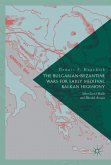In science, the predominant theories of the Thracian-Romanic origin of the Volohhs, which ignore part of the known sources on this issue. The essence of the author's hypothesis is that the Volohhs are a new ethnic group in the Carpathian-Balkan area, like other migrant peoples who appeared here in the Middle Ages - the Slavs, Bulgars and Hungarians. As in the case of the other peoples who came here, only a part of the Volohhs migrated to the west. The Volohhs who remained in Eastern Europe had a different historical fate; their descendants, according to the sources, are known under the names Volhvy (in Old Russian literature), Blokumenn (in Scandinavian sources), Ulah (in Eastern texts). Volhvs played an important role in the history of Ancient Russia where, as a stronghold of paganism, they offered stubborn resistance to the Kiev princes, who were imposing Christianity in the country. The word "sorcerers", originally being an ethnic concept, due to the specific role of the sorcerers in Russia, has acquired a purely professional meaning. The book will be interesting both to professional scientists, and to all interested in an origin of East Romans, paganism, history of Byzantium, Ancient Russia and the Carpatho-Balkan region.
In science, the predominant theories of the Thracian-Romanic origin of the Volohhs, which ignore part of the known sources on this issue. The essence of the author's hypothesis is that the Volohhs are a new ethnic group in the Carpathian-Balkan area, like other migrant peoples who appeared here in the Middle Ages - the Slavs, Bulgars and Hungarians. As in the case of the other peoples who came here, only a part of the Volohhs migrated to the west. The Volohhs who remained in Eastern Europe had a different historical fate; their descendants, according to the sources, are known under the names Volhvy (in Old Russian literature), Blokumenn (in Scandinavian sources), Ulah (in Eastern texts). Volhvs played an important role in the history of Ancient Russia where, as a stronghold of paganism, they offered stubborn resistance to the Kiev princes, who were imposing Christianity in the country. The word "sorcerers", originally being an ethnic concept, due to the specific role of the sorcerers in Russia, has acquired a purely professional meaning. The book will be interesting both to professional scientists, and to all interested in an origin of East Romans, paganism, history of Byzantium, Ancient Russia and the Carpatho-Balkan region.
In science, the predominant theories of the Thracian-Romanic origin of the Volohhs, which ignore part of the known sources on this issue. The essence of the author's hypothesis is that the Volohhs are a new ethnic group in the Carpathian-Balkan area, like other migrant peoples who appeared here in the Middle Ages - the Slavs, Bulgars and Hungarians. As in the case of the other peoples who came here, only a part of the Volohhs migrated to the west. The Volohhs who remained in Eastern Europe had a different historical fate; their descendants, according to the sources, are known under the names Volhvy (in Old Russian literature), Blokumenn (in Scandinavian sources), Ulah (in Eastern texts). Volhvs played an important role in the history of Ancient Russia where, as a stronghold of paganism, they offered stubborn resistance to the Kiev princes, who were imposing Christianity in the country. The word "sorcerers", originally being an ethnic concept, due to the specific role of the sorcerers in Russia, has acquired a purely professional meaning. The book will be interesting both to professional scientists, and to all interested in an origin of East Romans, paganism, history of Byzantium, Ancient Russia and the Carpatho-Balkan region.








